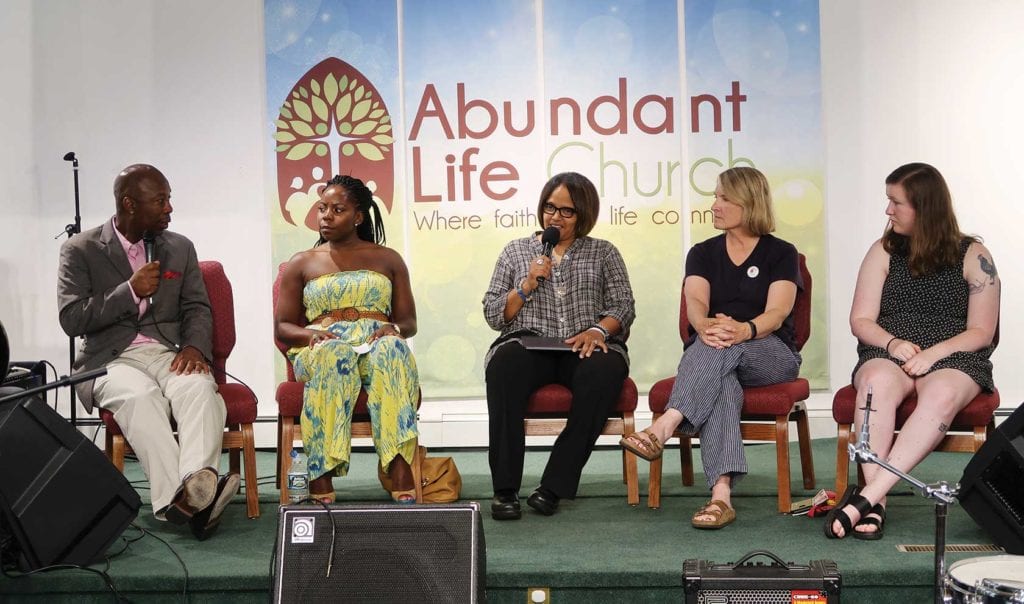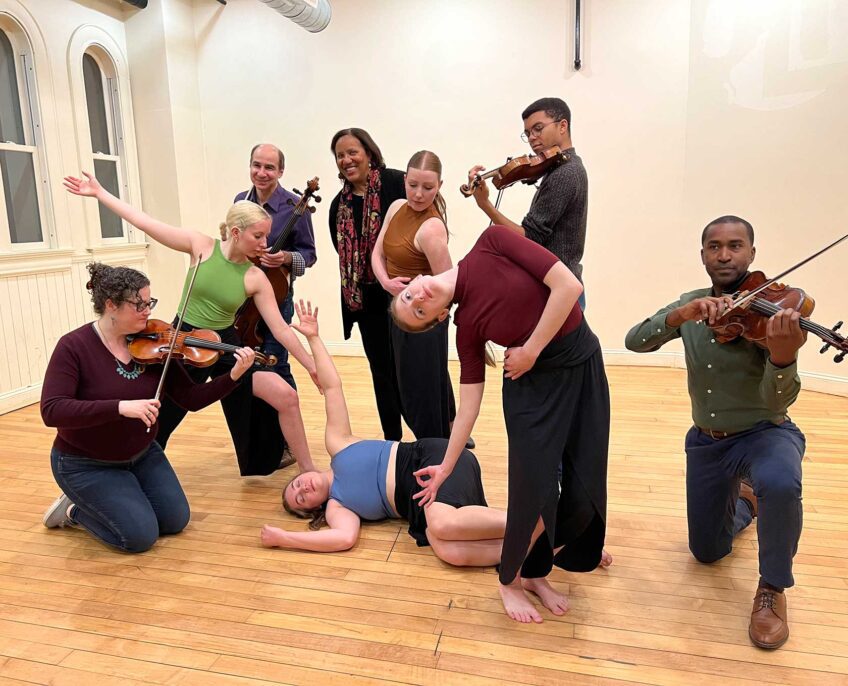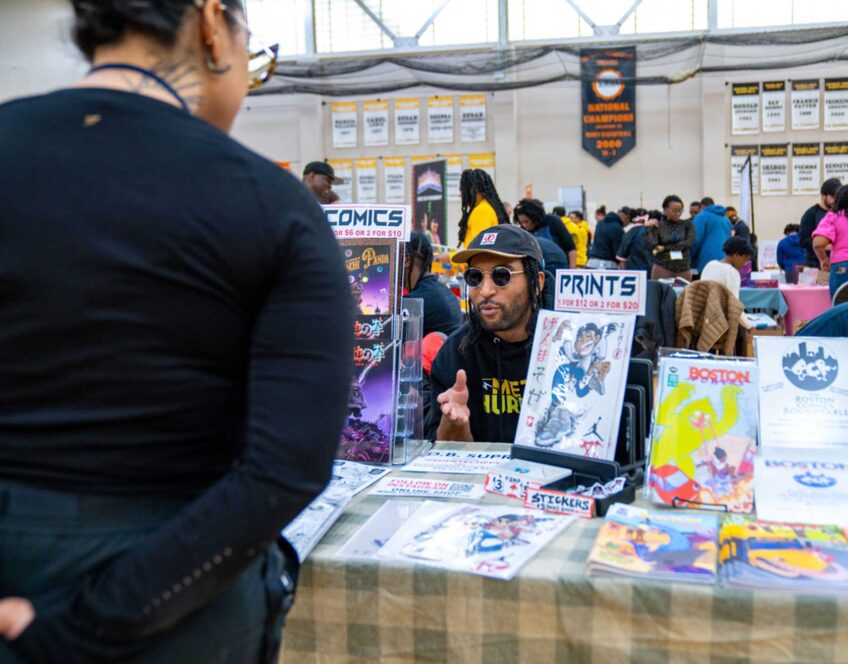Cambridge Jazz Festival offers first-rate music, thought-provoking panel

On Sunday, July 29, the fifth annual Cambridge Jazz Festival drew more than 10,000 people to Danehy Park in Cambridge for six hours of free, first-rate jazz.
This year, for the first time, the festival offered an additional day of programming, starting on Saturday with a panel and performance session entitled “Jazz & Gender: Challenging Inequality and Forging a New Legacy.” Renowned drummer and three-time Grammy winner Terri Lyne Carrington moderated the program, which was held in Abundant Life Church in Cambridge.
Panelists included Carrington, who is Zildjian Chair in Performance for the Berklee Global Jazz Institute; Ron Savage, the festival’s co-founder and music director, dean of the Professional Performance Division of the Berklee College of Music, and a drummer; Berklee Professor of Ensembles Tia Fuller, a saxophonist; and Ingrid Monson, Quincy Jones Professor of African American music at Harvard. Joining these jazz educators and musicians was alto saxophonist Nicole McCabe, a participant in Berklee’s new Summer Sessions: Women’s Performance Program, a five-week intensive residency led by Carrington that mentors young female instrumentalists.
Opening the Saturday program was prominent jazz radio host Eric Jackson, who on Sunday served his fifth year as festival MC. Jackson briefly praised a few of the women whose seminal contributions to jazz far outdistance their fame. He recalled how pianist, bandleader and composer Lil Hardin wrote, arranged and performed much of the music made famous by her husband, Louis Armstrong, noting that she nudged him to a career-making move from King Oliver’s band in Chicago to Fletcher Henderson’s orchestra in New York. “She never got credit,” said Jackson. He then spoke of pianist and composer Mary Lou Williams (1910-1981), whose influence and accomplishments are “beyond compare.”
Bias in action
Before tackling the topic of gender bias, Carrington chose first to show rather than tell, introducing an ensemble of Women’s Performance Program participants, who demonstrated their immense gifts as they performed a powerful set. Ensemble members were alto saxophonists McCabe and Kirsten Theodore, clarinetist Virginia Frigault Macdonald, trumpeter Akili Bradley and pianist Roella Oloro, as well as Becca Pasley and Alex Schwarz, who alternated on acoustic bass, and Maya Stepansky and Stephanie Phillips, who took turns on the drum kit.
They began by playing two Geri Allen compositions, the first a swinging, high-energy piece and then a blues-inflected work with a lyrical piano solo. Tia Fuller and Carrington joined the ensemble for their muscular rendition of the Arthur Schwartz classic “Alone Together.”
Carrington then began the panel discussion by asking her guests where and how gender bias is at play in the jazz industry, its toll, and what can be done about it.
Savage noted the too-familiar comment that a woman “can play like a guy,” saying that a musician’s goal is to play in a way that expresses unique life experiences and perspectives. “The goal is to be free when you play as your authentic self,” said Savage, “and really bring who you are to the music.”
Referencing pioneering civil rights activist W.E.B. Du Bois, Savage said, “What he wrote about racism applies to gender bias too. If a bias doesn’t affect you, it takes more attention to be aware of it and deal with it.”
A dean at Berklee, where women comprise 40 percent of the student body but only a handful of faculty roles, Savage said the school is evolving but needs to do more to “make the playing field level,” for women. Noting that six African American women have been astronauts, Savage said, “It’s easier for black women to go to moon than to get a job at Berklee, a school dedicated to the music of the African Diaspora.”
Pointing out another irony, Monson said, “Jazz music has been at the forefront of human rights movements, yet the jazz industry is so backward in gender equality. It’s a blind spot.” As a young trumpet player, Monson recalled finding that male peers seldom included female colleagues in jam sessions, saying, “Hanging out with female players was not cool.”
The cost of having few peers or willing mentors is more than social, said Monson. “Gender bias denies young women the opportunity to learn through the same experiences available to men.” Lacking the opportunity to try things, make mistakes, and stumble alongside peers and mentors, said Monson, “locks you out of experiences that enable you to enter the depth of your profession.”
Hidden impact
Carrington spoke of coming up in a family and community that supported her aspirations as a jazz musician. “I felt I had the right to be here,” said Carrington. “This is my music. I felt I could shine and do what I want to do.”
She continued, “Men need to take the initiative in mentoring young women. All my mentors were men.” Acknowledging that even with these advantages, managing her own way in the male-dominated jazz business has its challenges. “It can be hard,” said Carrington, “and that takes a toll. It’s really unfair. And I’m successful.”
Fuller, whose gigs include performing with Beyoncé, finds that while playing in the superstar’s all-female band is “powerful,” offstage she encounters “a subcurrent of sexism,” particularly among male tour managers. As a Berklee professor, Fuller makes a point of raising her students’ awareness of gender bias, and noted that her male students are often surprised to learn of the pain and pressure experienced by their female peers.
McCabe, 21, offered her perspective as a young musician. “I didn’t know many females in the music,” said McCabe. “I was often the only girl. I tried to blend in. It was hard for me. I needed to make a huge sound. I’ve gained confidence. I have a unique voice. It should be heard.”
Pleased to conclude on this note, Carrington then brought out the ensemble, which delivered an exuberant rendering of the Kenny Barron composition, “Voyage.”




![Banner [Virtual] Art Gallery](https://baystatebanner.com/wp-content/uploads/2024/04/NJ-H_1-713x848.jpg)

